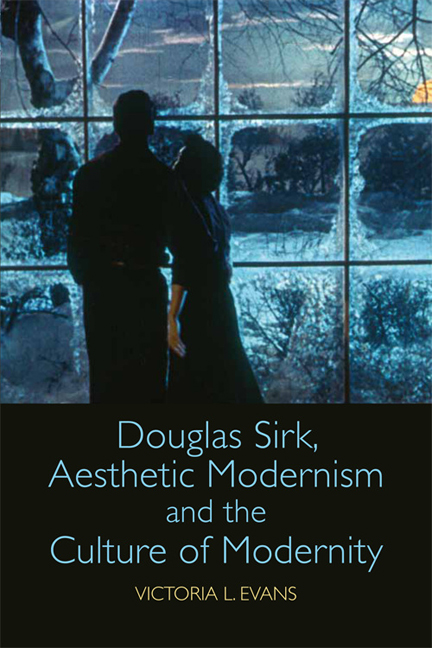Book contents
- Frontmatter
- Contents
- List of Figures
- Acknowledgements
- Introduction
- PART ONE SIRK AND THE VISUAL ARTS
- 1 Thinking with the Heart: Sirk and Pictorial Reception
- 2 Concerning the Spiritual in Art: Magnificent Obsession and the Influence of Modernist Painting
- PART TWO THE SHOCK OF THE NEW: TRACES OF MODERNITY
- PART THREE TWO ARCHITECTURAL CASE STUDIES
- Bibliography
- Index
2 - Concerning the Spiritual in Art: Magnificent Obsession and the Influence of Modernist Painting
from PART ONE - SIRK AND THE VISUAL ARTS
Published online by Cambridge University Press: 20 December 2017
- Frontmatter
- Contents
- List of Figures
- Acknowledgements
- Introduction
- PART ONE SIRK AND THE VISUAL ARTS
- 1 Thinking with the Heart: Sirk and Pictorial Reception
- 2 Concerning the Spiritual in Art: Magnificent Obsession and the Influence of Modernist Painting
- PART TWO THE SHOCK OF THE NEW: TRACES OF MODERNITY
- PART THREE TWO ARCHITECTURAL CASE STUDIES
- Bibliography
- Index
Summary
The exaggerated artifice of Douglas Sirk's best-known melodramas has often been remarked upon, but it has yet to be interpreted in the light of his detailed cognisance of the major art and architectural movements of the period. Despite the fact that this director's ongoing fascination with Modernist painting was first disclosed in a series of interviews that took place more than three decades ago, the influence of the theories of the German Expressionists upon his non-mimetic use of colour and composition has yet to be explored. When a sophisticated German expatriate reveals that in his university days he was ‘½ literary, ½ a painter’, then perhaps it is time for the second portion of this statement to be taken more seriously. To my mind, there seems little doubt that this director's non-naturalistic formal approach has been at least partially inspired by contemporary experiments in the visual arts. In other words, I would argue that Sirk rarely chose to manipulate his rich palette of intensely saturated colours simply to estrange the audience from the storyline or just for decorative effect. Rather, he tended to use particular hues that were already freighted with a pre-existing symbolic meaning in order to underscore the central themes of the narrative. Since in Sirk's version of Magnificent Obsession it is an Expressionist painter who initiates Bob Merrick into the cryptic philosophy that will change the course of his life, in this chapter I will attempt to re-examine this infamous film through the prism of the writings of Wassily Kandinsky.
In the first of the director's two projects starring Jane Wyman, Rock Hudson was cast as the reckless playboy (Bob Merrick) whose irresponsible actions cause a saintly doctor to die and his widow to go blind. These thoughtless deeds will eventually be redeemed once Merrick has completed his medical training and performed the operation that restores Helen Phillips’ sight. It is important to note, however, that this character's whole moral regeneration turns upon what he has learned in a chance encounter with an enigmatic painter called Edward Randolph. Merrick chooses to follow Randolph's advice, and only then discovers that an unwavering dedication to helping others also enables him to tap into some powerful transcendental force.
- Type
- Chapter
- Information
- Publisher: Edinburgh University PressPrint publication year: 2017



